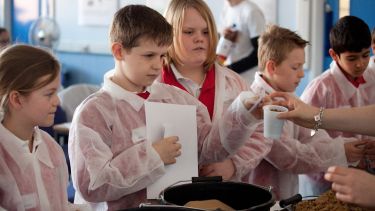Pre-16 school activities (Y5-Y11)
We have developed a range of innovative activities that are fun and engaging, designed to introduce pre-16 pupils to the idea of Higher Education, in a variety of ways.

The activities from our faculties and departments as well as local and national partners offer pupils the chance to learn about different subjects and the opportunities that university study offers.
We also have free resources for teachers and parents to use to support hands-on learning in the classroom.
Use the tabs below to find out more about our pre-16 offer.
- Sheffield Volunteering
-
Sheffield Volunteering at the University of Sheffield's Students' Union facilitates a wide range of student volunteering in local primary schools. Our students are always keen to share their time and skills with local children.
- Kroto Family Education Foundation
-
Discuss atoms and molecules with your pupils and even have a go at building ‘Buckyballs'. Use our fantastic ‘Buckyball Science Series Videos’.
- Higher Education Progression Partnership
-
Some of our primary activity is delivered through the Higher Education Progression Partnership (Hepp). Hepp is jointly funded by Sheffield Hallam University and 麻豆直播app and works across the Sheffield City Region to encourage more children and young people to consider higher education opportunities.
You can find out more information on the
- Hepp's Future Flyers
-
Hepp’s primary project ‘Future Flyers’ is aimed at Y5 and Y6 students and allows them to complete a mini research project on either careers or higher education. You can find out more information on the
For more details contact Hepp on hepp@shu.ac.uk or call 0114 225 4063
- The Confucius Institute
-
The Confucius Institute provides support to local schools to help their pupils learn about Chinese Culture, Mandarin Chinese as well as the study of China across all areas of school curriculum.
- Engineering activities
-
Primary school activities to help bring engineering into your classrooms.
- Physics activities
-
Browse our selection of classroom resources created by our staff and students to help you bring physics to life in your classroom.
- Children's University
-
麻豆直播app is delighted to be a validated Learning Destination with Sheffield Children’s University (CU). This means that children and young people who have a CU Passport to Learning can earn CU credits by participating in some of our activities.
Children’s University encourages children and young people, and their families, to take part in high quality learning activities in their own time. Evidence shows that taking part in these additional learning opportunities has a positive impact on confidence, motivation, self-esteem and developing a love of learning. Research both locally and nationally also suggests that pupils who take part in CU activities tend to do better and make more progress in school. Their attendance is also likely to be higher too.
For more information on how to join Sheffield CU, visit . For information on how to collect CU credits at our events and activities, please contact the event organiser.
- Building Learning Power - BLP
-
BLP is a sustained programme for Y5 and Y6 students who are care experienced, jointly administered and delivered in partnership by the University of Sheffield and the Sheffield Virtual School (SVS).
BLP aims to help children in care become better learners, raise attainment and develop independent study skills in Maths and English. The pupils receive extra tuition in school focusing on Maths and English skills in preparation for their SATS. As part of BLP, the children also take part in university activities providing opportunities for the young people to meet University staff and student ambassadors to find out more about Higher Education. The activities also allow pupils to get to know each other, build confidence and resilience, engage socially, find out about university, have fun and make progress.
- Alfred Denny Museum
-
The Alfred denny Museum, located in our Alfred denny Building, is a zoological teaching museum used to illuminate the diversity of the animal kingdom through its large collection of specimens. It was established in 1905 and has been used for undergraduate teaching for more than 100 years. The museum is open for guided tours on the first Saturday of each month. Book a tour now

